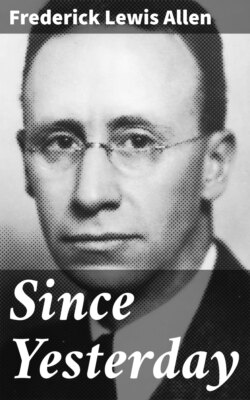Читать книгу Since Yesterday - Frederick Lewis Allen - Страница 3
На сайте Литреса книга снята с продажи.
PREFACE
ОглавлениеTable of Contents
Ever since, in Only Yesterday, I tried to tell the story of life in the United States during the nineteen-twenties I have had it in the back of my mind that some day I might make a similar attempt for the nineteen-thirties. I definitely began work on the project late in 1938 and had it three-quarters done by the latter part of the summer of 1939, though I did not yet know how the story would end. The outbreak of war in Europe provided an obvious conclusion, since it promised to end an era perhaps as definitely as the Panic of 1929 had ended one. By an odd chance, the declaration of war upon Germany by the British and French governments took place ten years to a day after that September 3, 1929, which I had already made the subject of my first chapter. It gave me a turn to realize how precisely the course of events had provided me with a decade to chronicle.
The span of time covered in Only Yesterday was from the Armistice of November 11, 1918, to the Panic of October-November, 1929, with a concluding chapter which recited the course of events between the Panic and the spring of 1931 and tried to suggest how the temper of the country had altered during that post-Panic interval. (The book was published in December, 1931.) When I came to plan the present volume it was clear that some overlapping would be necessary, for obviously the story of the nineteen-thirties should start before the Panic and give some idea of the high place from which the country fell during the economic collapse of 1929-32. Hence my decision to begin with a study of things as they were on September 3, 1929 (which I had written in somewhat different form as an article in Harper's Magazine in 1937), and in a second chapter to cover the Panic and the course of events up to the spring of 1931. The story of the Panic itself, however, I have abbreviated in this book, since I told it in considerable detail in Only Yesterday.
The problem of selection and emphasis, always difficult, is of course doubly difficult when one is writing so close to the event. In Only Yesterday I brought into sharp relief manners and customs, fads and follies, and everyday circumstances of life. In the present volume I have done the same thing to some degree, but not quite as much; for the heart of the story of America in the nineteen-thirties was obviously the enormous economic and political transformation which took place, and such trivialities as had been of the essence of life in the United States in the nineteen-twenties were now, it seemed to me, less significant. Future events may make my selection and appraisal of material look very dated; in that case I can only hope my very miscalculations may have a certain paradoxical value as indicating the sort of pitfall into which one readily fell in 1939, even if one were conscientiously intent upon presenting a fair appraisal.
F. L. A.
